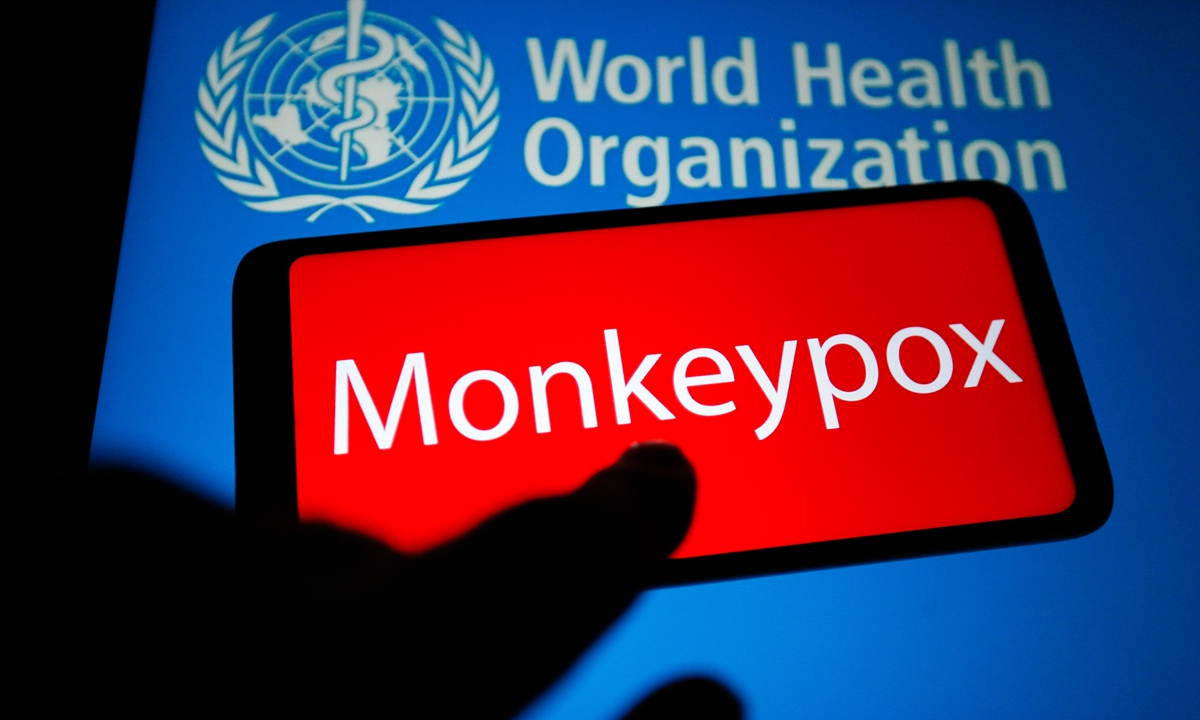
Monkeypox Photo: VCG
China's test kit producers, the major contributors to testing products for COVID-19, are dealing with what could be a new and busy production, but with full readiness and confidence, after the WHO declared monkeypox a global health emergency following the virus' rapid spread in many places.
While the coronavirus lingers in many parts of the world, the new demand for testing kits driven by monkeypox has raised concerns over a possible tightened supply. But producers told the Global Times on Tuesday that their capacity is adequate and flexible in meeting new orders.
Shares of medicine-related companies opened higher on Tuesday, sustaining gains from Monday, but closed lower, indicating that the market is taking a rational view, especially in light of adequate production capacity.
Liferiver, a Shanghai-based testing kit producer, received an urgent order for monkeypox nucleic acid detection reagents from the WHO, and the products will be supplied to 17 African countries including Angola, Algeria, Ethiopia and Kenya.
A manager with Liferiver surnamed Wang told the Global Times on Tuesday that the orders came almost at the same time as the WHO declared the health emergency.
Sansure Biotech, a test kit maker in Changsha, Central China's Hunan Province, told the Global Times on Tuesday that it is already exporting reagents, but the amount is not very large compared with testing kits for COVID-19.
The company got dozens of inquiries every day, even before it obtained the CE certificate on May 25, a person with the company said.
Nearly 20 countries and regions including France and the United Arab Emirates have imported monkeypox reagents from Sansure Biotech.
More than 30 Chinese companies that are in the in vitro diagnostics business have obtained the EU's CE certificate or access for monkeypox virus nucleic acid detection reagent products, driven by the global demand, according to media reports.
Moreover, a fast-spreading US outbreak is driving up testing needs. The Biden administration is reportedly weighing whether to declare the nation's monkeypox outbreak a public health emergency.
Patients there face days-long waits for test results, and order inquiries from the US are increasing, media and industry insiders said.
Jiangsu Bioperfectus Technologies is getting a lot of orders and inquiries, and test kits are being exported to more than 100 countries, the company said in a statement sent to the Global Times on Tuesday, noting that the order inquiries from the US has seen a conspicuous growth.
The company's test products have recently been verified in a French military lab, and it also got an order from the WHO. On Friday, the company announced a strategic partnership with ELITechGroup SpA for monkeypox virus testing in Europe.
The monkeypox virus is transmitted from infected animals to humans via indirect or direct contact. "Though the risk of monkeypox globally and in the region is moderate, the potential of its further international spread is real," Poonam Khetrapal Singh, director of the WHO's Southeast Asia Region, said on Sunday.
There are over 16,000 cases of monkeypox that have been reported from 75 countries, according to the WHO.
There have been no reports of cases in the Chinese mainland or in the Hong Kong and Macao special administrative regions.
Companies said there's no need to worry about test supplies despite the rising demand. Liferiver told the Global Times on Tuesday that the company's daily production capacity is 4 million doses, and there are enough materials to make test kits.
"Even though the orders from the WHO are the largest of the kind for us, they're still a fairly small portion of our total test business," the manager with Liferiver said.
Chinese test kit makers shouldered most of the world's testing needs for COVID-19, and it's expected to be the same for the monkeypox virus, especially as mature production lines and capacity are already there, industry insiders said.




